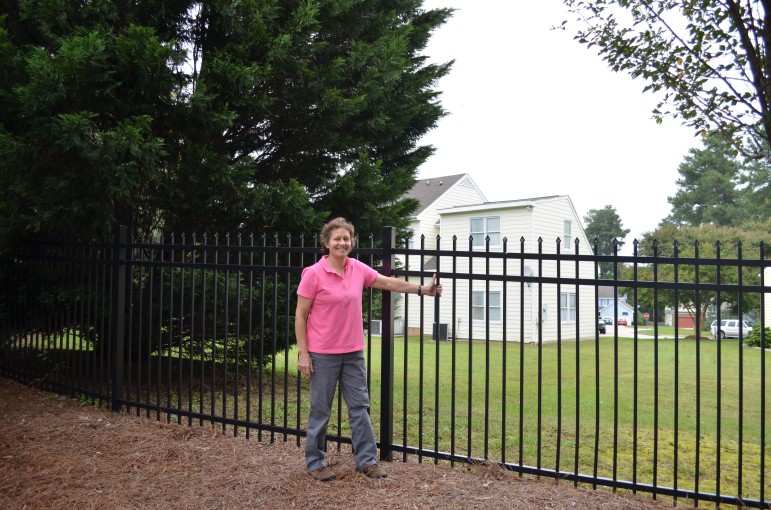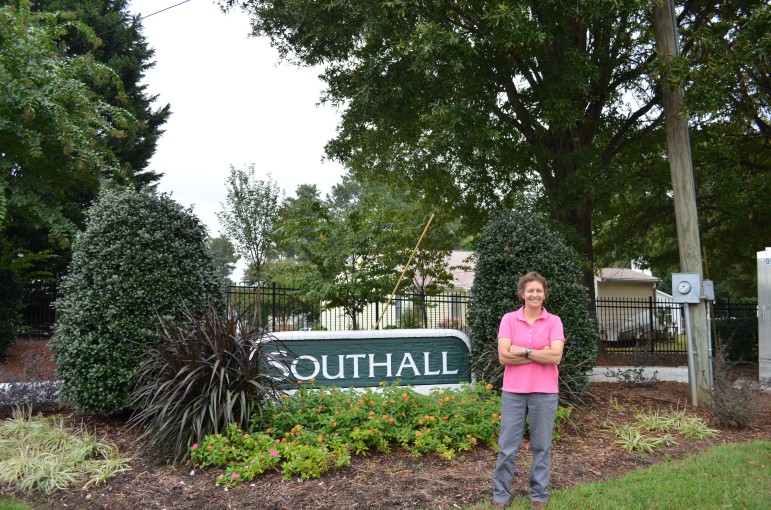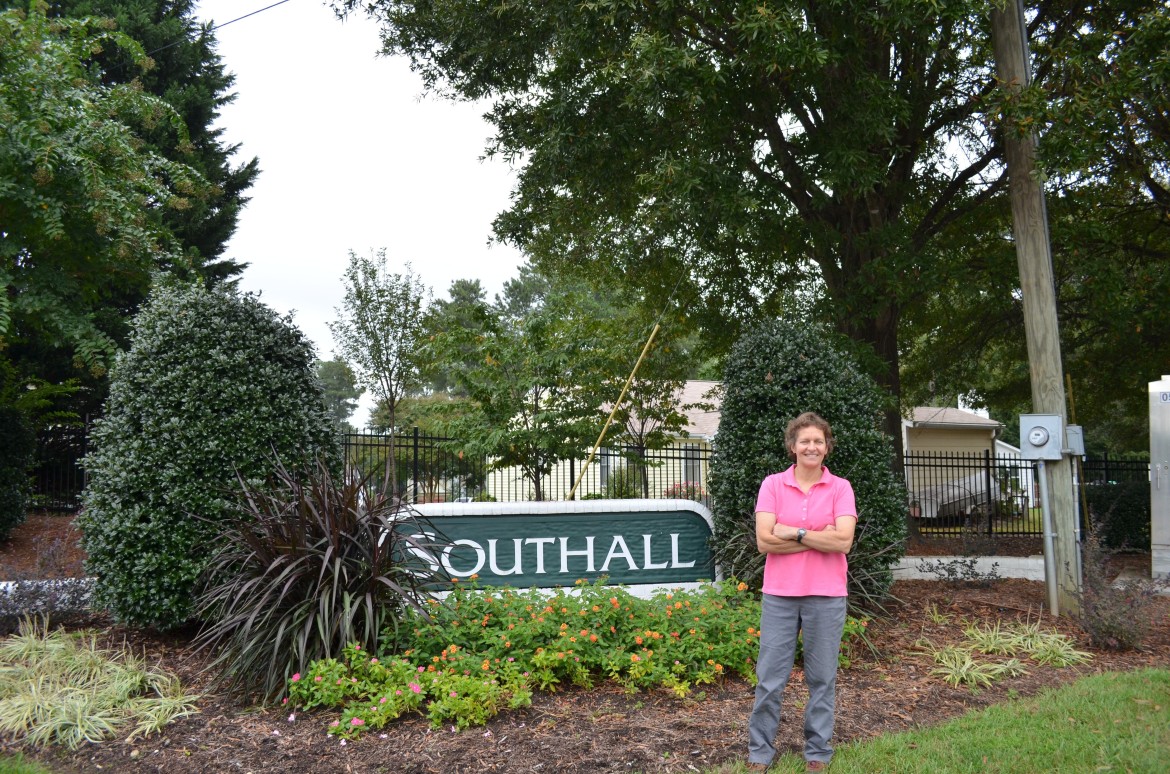Southhall resident Kay Metzner, 56, had no interest in getting more involved with her neighborhood Homeowner’s Association. But in 2010, when the HOA decided to replace a wooden fence with an aluminum version, she thought she had no choice.

“The prices were just to me outrageous, when you consider there are 424 homes,”she said.
The HOA had decided to replace the fence because after more than 25 years of wear and tear, it was getting too expensive to maintain. Members decided an aluminum version was a better option, though the cost would raise everybody’s HOA fees.
“The wooden fence would have to be replaced periodically, because the materials that one might use with a wooden fence now were not as good as the materials used when that fence was first installed,” said Keith Randleman, president of the HOA.
He added later, “We had the choice of installing a fence that would last for 50 years.”
Metzner vocally opposed the fence, even going so far as to collect signatures from more than half the homeowners in the neighborhood, she said. But Randlemandisputes that and says Metzner never presented him with a petition.
Metzner claims she stood up in a community meeting announcing she had the petition and was ignored.
The HOA went ahead with its plans; the wooden fence came down, the aluminum fence went up, and immediately, there were problems, Metzner said.
The wooden fence gave homeowners a measure of privacy from cars and passers-by on New Hope Road, but the aluminum fence changed all that, she said. Worse, the noise from passing traffic became a nuisance which the wooden fence had once blocked.
Randleman disagrees.
“That was never an issue,” he said. “I think that it’s fair to say that we were certainly on opposite sides of the issue. But I think that we presented all the information we could to the community regarding the options of replacing that fence. We did the best we could.”
And he said the decision has turned out to be the correct one. Any concerns residents had when the fence went up were addressed, he said, adding that now people appreciate it.
Regardless, Metzner didn’t like the HOA’s decision. She had once been on the board and didn’t enjoy it, but she said she couldn’t sit by any longer.
“I just felt they were going in the wrong direction; they were being too frivolous with their money.”
A State Inundated
Similar conflicts play out in neighborhoods across Raleigh and the rest of North Carolina.
John Stone is president and CEO of Community Association Services, an HOA management company that works with 210 HOAs around the state — most of them in Raleigh. He said North Carolina has a little more than 18,000 HOAs and that a little over 50 percent of the state lives in one.
CAS performs the business functions for its HOAs, about 99 percent of which have been formed into corporations. CAS collects dues, creates corporate financial reports and files state and federal taxes for the HOAs.
While residents sometimes complain that HOAs have too much control, Stone said they represent the best of American values.
“I think they’re the purest form of democracy there is,” he said.
HOAs are made up of neighborhood residents elected to the governing board, and they usually perform a few main functions. One — the one that often ends up creating conflict — is to protect the covenants established by developers when the neighborhoods are created.
Adam Gartenberg, president of the Alyson Pond HOA, said the covenants are there to tell people what they can and cannot do on their property. For instance, they might prohibit satellite dishes in the front yard or dictate what kinds of fences a homeowner can have.
If a homeowner doesn’t want those kinds of rules and regulations, he said they can just choose to live somewhere without an HOA.
“People that want to have the freedom, they want to paint their house purple with pink shutters … they can do that.”
He said complaints are rare.
Occasionally there will be homeowners who are not taking care of their yards for a month or two. He can think of one or two examples in the past seven years in his neighborhood. Or perhaps homeowners make changes to their homes that upset their neighbors. He can only think of three examples in the past seven or eight years for that.
Alyson Pond has more than 200 homeowners, and given that number, actual problems are exceedingly rare, he said.
“That’s a lot of opportunity for things to happen, and by and large, it doesn’t,” he said.
Who Sets the Rules?
The rules governing how HOAs behave are laid out by state law.
The North Carolina Planned Communities Act explains everything from how an HOA can be created to what powers it can have, including maintenance, improvement of common areas (as in Metzner’s case), fines for violations of rules and the hiring of management companies. In addition to the state laws, HOAs have their own bylaws — created by the neighborhood developers — that govern them.
But not all HOAs are created equal. While Southhall and Alyson Pond both give their HOAs the powers to police covenant violations and make improvements, the Stonehenge neighborhood in North Raleigh limits its HOA.
Diane Lahti is a member of the board. She said the neighborhood was built in the 1970s and the developers kept the ability to enforce the covenants. Since the neighborhood doesn’t have any common areas, the HOA mainly promotes social activities like a pool party, plant swap, children’s parties and the creation of a list-serve.
She said from time to time, people come to the board with complaints about their neighbors, in which case the HOA sends out a letter informing the homeowner that someone has a complaint. If action is needed, the HOA refers people to the developer.
But Stonehenge’s HOA is a marked contrast to many in that it’s voluntary. In many neighborhoods, homeowners have no choice but to belong and pay dues. And failure to pay those dues can have serious consequences.
A Grave Penalty
What many homeowners may not realize is that HOAs can have the power of foreclosure. If a member fails to pay his or her dues and doesn’t rectify the situation, the HOA can actually foreclose on the house, leaving the owner homeless.
Victor Boone, senior managing attorney at Legal Aid of North Carolina, said those are the complaints Legal Aid hears most often in reference to HOAs.
The resident will begin to get warning letters. If the warnings are ignored and the HOA lawyers come into the picture, things can escalate quickly.
“That’s where the problem really starts for them, because the attorney fees can be really substantial,” he said.
Legal fees are capped at $1,200 by the state. However, that only applies to uncontested foreclosures. If the homeowner fights the proceedings, the cap is lifted and fees can skyrocket.
Even if they are capped, $200 worth of unpaid dues could end up costing the homeowner an additional $1,200 in legal fees, Boone said. And people don’t always realize the seriousness of the situation.
“They will put off paying those dues because they don’t realize that their house can be foreclosed on,” he said.
And if homeowners can’t afford the legal fees on top of the dues, then they may end up losing their house.
“The abuses are terrible, and the circumstances that people find themselves in are really deplorable circumstances,” said Al Ripley, director of the Consumer & Housing Project for the NC Justice Center.
He admits that not all HOAs resort to foreclosure. Some will go to great lengths to make sure people don’t lose their homes.
“You’ve got some HOAs that are run very well with well-intentioned, responsible, reasonable people who see foreclosure as a last resort,” he said.
But there are others that are run badly, full of unprofessional members who abuse their authority, he said.
Hope Carmichael is an attorney with Jordan Price Wall Gray Jones & Carlton who represents many HOAs.
She said actually getting to a foreclosure is relatively rare in her experience.
“In our practice, about 90 percent of the collection files are paid in full before they get to foreclosure,” she said.
And even then, she said HOAs do everything possible to avoid it.
“This only happens after scads and scads of communications with the homeowner begging them to get on a payment plan to work with the HOA,” she said. “The HOA is not in the business of owning property and renting property. They would much rather work with people to stay in the property.”
She adds that the HOA only has one source of revenue: its members. If someone doesn’t pay, all the other members have to make up for it.
Ripley acknowledged that it’s difficult to tell how often HOAs actually take a homeowner all the way to foreclosure. The courts don’t have a way of tracking foreclosures in a way that shows how many were instigated by HOAs. But he said in his office, he sees it a lot.
“It happens enough that it’s a serious concern,” he said.
If You Can’t Beat ‘Em, Join ‘Em
There is no higher authority to turn to if a homeowner has a problem with an HOA. HOAs have their own procedures to handle complaints, but if a resident isn’t satisfied, then legal help is the only recourse.
But Metzner discovered another way to influence the HOA: join the board.
After the situation with the fence, she ran for the board and became a member. At first, she didn’t get along great with her fellow members.
“I was the one vote that was against everybody else,” she said.
But after a few years, the ice has melted somewhat. She said the board has had an opportunity to bond, and they now share a more common outlook. However, she added that there are still things they disagree on.
As for the fence, by the time she got on the board, it was too late to do anything about it. And it’s still standing.

Alex Granados / Raleigh Public Record
Kay Metzner stands proudly outside her Southall neighborhood
